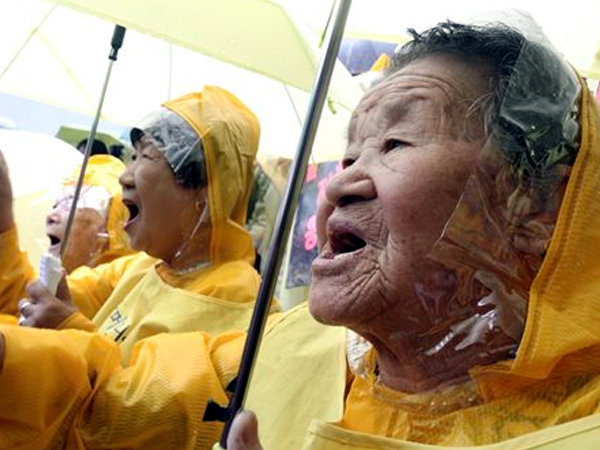
Former comfort women who served the Japanese Army as sexual slaves during World War II shout a slogan in a rally before Korean Liberation Day of August 15, which marks the end of Japanese colonial rule in 1945, in front of the Japanese Embassy in Seoul in this 2009 file photo. AP
TOKYO—A Japanese panel confirmed the validity of a study that led to Japan’s landmark 1993 apology for forcing Asian women into wartime prostitution, even as South Korea blasted the review as a move that “picks again at the painful wounds” of victims.
The probe, whose results were released Friday, shows how even 70 years later, World War II history remains an extremely sensitive topic in East Asia, especially when Japan’s relations with its two closest neighbors are soured by territorial disputes.
Prime Minister Shinzo Abe has been criticized by South Korea and China for backpedaling from past Japanese apologies and acknowledgements of wartime atrocities, and the two countries saw the investigation into about 250 documents as an attempt to undermine the 1993 apology.
Historians say 20,000 to 200,000 women from across Asia, many of them Koreans, were forced to provide sex to Japan’s front-line soldiers. Japanese nationalists contend that the so-called “comfort women” in wartime brothels were voluntary prostitutes, not sex slaves, and that Japan has been unfairly criticized for a practice they say is common in any country at war.
The five-member panel examined how the study, which included interviews with 16 former Korean victims, was conducted. It did not evaluate its historical findings.
“We concluded that the content of the study was valid,” said lawyer Keiichi Tadaki, who headed the group.
But Seoul criticized the review as contradictory, meaningless and unnecessary, saying that Tokyo should know that any action “that again picks at the painful wounds of the victims will never be forgiven by the international society,” according to Foreign Ministry spokesman Noh Kwang-il. He urged Japan to admit its responsibility and immediately propose a solution that the elderly victims can accept.
Many South Korean women have demanded a full apology accompanied by official government compensation.
In 1995, Japan provided through a private fund 2 million yen ($20,000) each to about 280 women in the Philippines, Taiwan and South Korea, and funded nursing homes and medical assistance for Indonesian and former Dutch sex slaves. In South Korea, only seven women accepted the money out of more than 200 eligible recipients.
Government spokesman Yoshihide Suga reiterated Abe’s pledge not to revise the 1993 apology, offered by then-Chief Cabinet Secretary Yohei Kono and known as the “Kono Statement,” which acknowledged that many women were forced to provide sex for Japanese soldiers. Suga added that evaluation of the historical evidence should be left up to historians and scholars.
“South Korea is one of Japan’s most important neighbors and we continue to seek to improve our relations through various levels of dialogue,” Suga said.
As the Korean women grow older, they and supporters have stepped up their protests, including building statues in the US to gain international support for their cause, upsetting the Japanese rightists.
The panel started its review in April after Nobuo Ishihara, a top bureaucrat who helped in the 1993 study, questioned the authenticity of the interviews, while suggesting Seoul possibly pressured Tokyo into acknowledging the women were coerced. Ishihara spoke at parliament as a witness for a nationalist lawmaker who demanded the review.
Tadaki, who briefed reporters on the contents of the report, said Japan had enough evidence from other documents to produce the apology and that the interviews with the women were supplementary and intended to show Japan’s compassion rather than to verify historical evidence.
His team’s report acknowledged Tokyo and Seoul negotiated at length over the wording, and that it did not distort historical facts or cause either side to compromise its position, he said.
The report said Seoul urged Tokyo to show sincerity and acknowledge coercion to make an apology acceptable to the South Koreans. The two countries agreed to keep secret their negotiations over the apology statement.
The report noted Ishihara had insisted Japan should never acknowledge all “comfort women” were forced. It said Japan was initially reluctant to meet the women due to fear it would create an uncontrollable and endless situation.
The United States counts both Japan and South Korea as key allies. The State Department said it took note of Suga’s statement and the Abe government’s position to uphold the apology.
“Because South Korea and Japan have so many common interests, it’s important they find a way to resolve the past in the most productive manner and look to the future on how they can work together on issues they share,” spokeswoman Jen Psaki told reporters in Washington.
Relations are already strained in the region, and adding to the ire, the South Korean navy on Friday conducted live-fire exercises in seas near islands that are claimed by both countries. Top Japanese officials protested the drills, but South Korean officials said the exercises were routine and rejected Tokyo’s demands to cancel them.
RELATED STORY
Ex-sex slaves demand Japan PM acknowledge past

